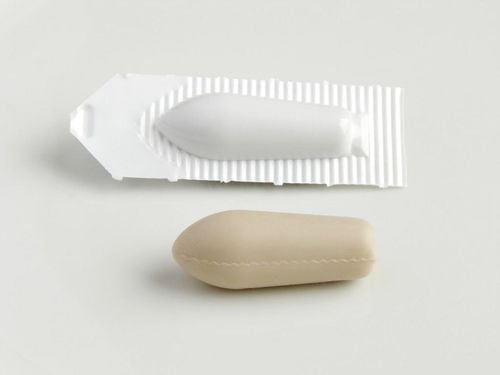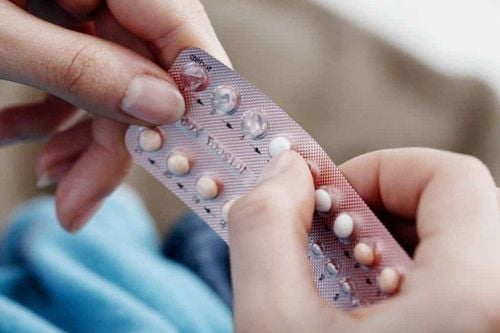Primolut-N is a progestogen containing norethisterone, used in treating cases such as dysfunctional uterine bleeding - abnormal bleeding from the uterus that is not caused by any underlying medical condition, primary or secondary amenorrhea (when a woman doesn't have her menstrual periods), menstrual regulation, endometriosis, etc. So, what exactly are the uses of Primolut-N?
1. What is Primolut-N?
Primolut-N contains norethisterone, a potent progestogen. Its progestogenic effects on the endometrium help treat menstrual disorders, primary and secondary amenorrhea, and endometriosis. Based on these stabilizing effects, Primolut-N can also alter the timing of menstruation.
Norethisterone can suppress gonadotropin (a type of hormone that stimulates the activity of the reproductive organs) secretion and inhibit ovulation at doses of 0.5 mg/day. It also shows positive effects in managing premenstrual symptoms by inhibiting ovarian function. Similar to progesterone, norethisterone can induce thermogenesis and alter body temperature.
2. Indications and Contraindications
2.1 Indications for Primolut-N
Primolut-N is used for the following:
- Dysfunctional uterine bleeding (non-organic cervical bleeding) and prevention of recurrence due to functional disorders.
- Primary and secondary amenorrhea: Pregnancy and prolactin-secreting pituitary tumors should be ruled out before treatment. Prolonged high-dose estrogen use may cause tumor enlargement.
- Premenstrual syndrome (PMS): Relieves symptoms like headaches, water retention, and breast tenderness.
- Menstrual regulation: Can delay monthly menstruation, but only for those not at risk of pregnancy during treatment.
- Endometriosis.
In addition to these uses, Primolut-N may treat other conditions not listed here. Always consult a doctor before using the medication.
2.2 Contraindications
Do not use Primolut-N if:
- Pregnant, suspected of being pregnant, or breastfeeding.
- Progressive venous thromboembolism.
- High risk of arterial or venous thromboembolism.
- History or presence of:
- Cardiovascular or arterial diseases (e.g., heart attack, stroke, ischemic heart disease).
- Warning signs of thromboembolism (e.g., transient ischemic attacks, chest pain).
- Thromboembolic events (e.g., deep vein thrombosis, pulmonary embolism, heart attack), or stroke.
- Severe liver disease or unresolved abnormal liver function tests.
- Liver tumors (benign or malignant).
- Migraines with neurological symptoms.
- Diabetes with cardiovascular complications.
- Hormone-dependent tumors.
- Allergic to any components of the medication.
3. Usage and Dosage
Primolut-N is taken orally and can be consumed with or without food, accompanied by a full glass of water to avoid stomach irritation. Dosages vary based on the condition and the patient’s age:
- Dysfunctional uterine bleeding: 1 tablet, 3 times daily, for 10 days.
- Prevention of recurrence: 1 tablet, 1–2 times daily, from days 16 to 25 of the menstrual cycle.
- Primary/secondary amenorrhea: Supplement estrogen for 14 days before starting Primolut-N. Then take 1 tablet, 1–2 times daily, for 10 days. When endogenous estrogen production has been established, discontinue estrogen to induce menstrual bleeding by taking 1 Primolut-N tablet twice daily from day 16 to day 25 of the cycle.
- Premenstrual syndrome: 1 tablet, 1–3 times daily.
- Menstrual regulation: 1 tablet, 2–3 times daily for up to 10–14 days, starting 3 days before expected menstruation.
- Endometriosis: Start from days 1–5 of the cycle with 1 tablet twice daily. Increase to 2 tablets twice daily if light bleeding occurs, reverting to the initial dose once bleeding stops. Continue for 4–6 months. Ovulation and menstruation are suppressed while taking the medication.
To maximize the benefits of Primolut-N, it is important to use it consistently. For safe use, always follow your doctor's instructions. Do not take more, less, or for a longer period than prescribed. Avoid long-term or excessive use, as this can worsen your condition and increase the risk of adverse effects.
4. Potential Side Effects of Primolut-N
Some potential side effects include:
- Reproductive system and breast disorders: Abnormal uterine/vaginal bleeding, including spotting, amenorrhea (absence of menstruation), especially in cases of endometriosis.
- Skin: Itching, rash.
- Nervous system: Headache, migraine.
- Eyes: Visual disturbances.
- Respiratory system: Difficulty breathing.
- Digestive system: Nausea.
Before prescribing Primolut-N, doctors always weigh the benefits and effectiveness against the potential risks of side effects. However, some individuals may still experience adverse reactions while using Primolut-N. Therefore, if you notice any unusual symptoms, especially severe allergic reactions accompanied by difficulty breathing, severe dizziness, swelling, rash, or itching of the face, throat, or tongue, you should immediately notify a healthcare professional.
5. Precautions When Using Primolut-N
Some precautions to consider when using Primolut-N include:
- Inform your doctor about any history of allergies to Primolut-N or any other allergies. Primolut-N may contain inactive ingredients that could cause allergic reactions or other serious problems.
- Notify your doctor of any medications you are currently taking, including prescription drugs, over-the-counter medications, herbal remedies, supplements, food products, dyes, or preservatives.
- Light bleeding may occur during the use of the medication after the first bleeding cycle ends. Do not pause or stop taking the medication. Approximately 2–4 days after completing the treatment, withdrawal bleeding, which is similar in duration and intensity to normal menstruation, may occur.
- Prolonged or heavy bleeding: If bleeding continues despite regular medication use, the cause may be related to structural abnormalities or extragenital factors (e.g., polyps, carcinoma in the upper cervix or endometrium, fibroids, incomplete miscarriage, ectopic pregnancy, or coagulation disorders). Further measures may be required. Similarly, if bleeding initially stops but then recurs heavily during treatment, other interventions may be necessary.
- Exercise caution when using Primolut-N in cases with risk factors for venous thromboembolism (e.g., personal or family history, age, obesity, prolonged immobilization, major surgery, or trauma-related surgery), as the risk increases in women of reproductive age.
- Tumors: Monitor for benign liver tumors (rarely malignant). Report immediately if there is severe upper abdominal pain, liver enlargement, or signs of intra-abdominal bleeding.
If you forget to take a dose, take it as soon as possible. However, if it is close to the time for the next dose, skip the missed dose and continue with your regular schedule. Do not double the dose to compensate for a missed one. Overdose of Primolut-N may lead to serious symptoms such as nausea, vomiting, abdominal pain, or weakness.
6. Drug Interactions
Drug interactions may reduce the effectiveness of Primolut-N or increase the severity of its side effects. Inform your doctor about all the medications you are currently taking, including vitamins, over-the-counter drugs, prescription medications, and herbal supplements. Do not stop, start, or change the dosage of any medication without your doctor's approval.
Some drugs that may interact with Primolut-N include:
- Long-term treatment with drugs that induce liver enzymes (e.g., phenytoin, barbiturates, primidone, carbamazepine, rifampicin, oxcarbazepine, rifabutin) may increase the clearance of Primolut-N, reducing its therapeutic effectiveness.
- Interactions with the metabolism of certain drugs (e.g., cyclosporine).
- Primolut-N may affect laboratory test results, including liver function tests, thyroid, adrenal, and kidney function tests, levels of plasma proteins such as corticosteroid-binding globulin, lipids/lipoproteins, carbohydrate metabolism indices, and coagulation/bleeding indices. These changes typically remain within acceptable limits.
7. Storage Instructions for Primolut-N
Store Primolut-N at room temperature, away from light and moisture. Do not store it in damp places or in the freezer. Different medications may have specific storage requirements, so always read the storage instructions on the package or consult a pharmacist. Keep Primolut-N out of reach of children and pets.
If the medication becomes damaged or expires, dispose of it properly. Do not discard Primolut-N in drains or toilets unless instructed to do so. Consult your local waste disposal company or pharmacist for safe disposal methods to protect the environment.
Primolut-N is a progestogen containing norethisterone used to treat cases such as dysfunctional uterine bleeding, primary or secondary amenorrhea, menstrual regulation, and endometriosis. However, it may cause certain side effects and interact with other drugs. Therefore, it is essential to inform your doctor about all the medications you are taking to minimize the risk of side effects and enhance treatment effectiveness.
To arrange an appointment, please call HOTLINE or make your reservation directly HERE. You may also download the MyVinmec app to schedule appointments faster and manage your reservations more conveniently.













